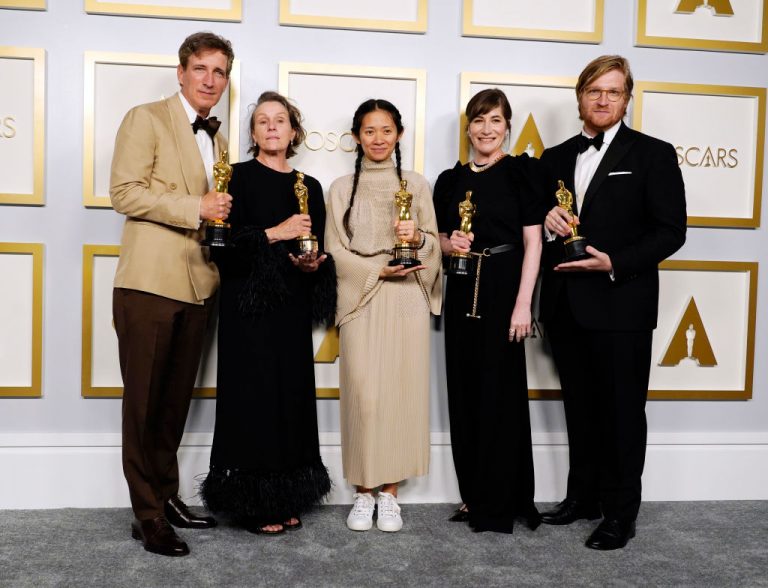American drama film Nomadland won the Oscar for best picture on April 25. Chloe Zhao, who wrote, edited, and co-produced the film, made history as the first Asian woman to win the coveted Best Director award.
Nomadland is based on American journalist Jessica Bruder’s book, Nomadland: Surviving America in the Twenty-First Century. The film depicts the journey of a woman who sells everything she owns and leaves her hometown to travel through the U.S. Midwest after her husband’s death. Actress and co-producer Frances McDormand also became the first person in history to win Academy Awards for the same film.
Zhao, 38, was born in Beijing. Her father, Zhao Yuji, was the former General Manager and Vice Chairman of China’s Shougang Group. According to a report by Chinese-language independent media outlet Dajiyuan, her mother, Huang Tao, works in a hospital, while her stepmother is the famous Chinese comedian Song Dandan.
Despite her achievements, Zhao’s personal life is shaded with a melancholy tone. Not only did her step mother remain silent, without congratulating Zhao on the honor of her historic Oscar win, but communist China’s state run media also failed to properly acknowledge her successes.
Zhao, who is one of the highest-profile up-and-coming female directors in Hollywood, also won the Best Director award at the Golden Globes, the Critics’ Choice Movie Awards, and the Directors Guild of America Awards, as well as nearly 40 other awards and titles worldwide.
Success
You are now signed up for our newsletter
Success
Check your email to complete sign up
Her previous works include “Songs My Brothers Taught Me” (2015) and “The Rider” (2017), both of which won critical acclaim at the Cannes Film Festival in France.
‘People are birth are inherently good’
In her Oscar acceptance speech, Zhao referred to her culture by reciting a classical Chinese saying from the Three Character Classic, a Chinese educational text traditionally used to educate youth with upright moral values. The line, ren zhi chu, xing ben shan (人之初 性本善), can be translated as “people at birth are inherently good.”
Zhao explained the axiom helped her keep going when the going got tough, “I still truly believe [the principle] today, even though sometimes it might seem like the opposite is true, but I have always found goodness in the people I met everywhere I went in the world.”
“So this is for anyone who has the faith and the courage to hold on to the goodness in themselves. And to hold on to the goodness in each other, no matter how difficult it is to do that,” Zhao said.
Still, the CCP’s propaganda mouthpieces, which exclusively speak on behalf of the regime and its political decrees, refrained from immediately reporting her Oscar win. The state’s internet censors also sabotaged the live broadcast of the award ceremony in Hong Kong and mainland China.
Zhao’s own people and fans weren’t even allowed to support her in the mainland, and when Zhao’s NYU alumni broadcast the ceremony live from a small bar on the Bund in Shanghai, that too was blocked by the CCP’s Great Firewall internet censorship scheme.
‘Chinese or American?’
When Zhao won the Golden Globe for Best Director, on March 1, the English version of Communist Party propaganda outlet Global Times ran an article titled “China’s Pride,” in which they at first congratulated Zhao. Strangely, the next day, Global Times published another article, this time with a challenging tone towards Zhao, titled “Chinese or American? Chinese netizens question the nationality of Golden Globe-winning director Chloe Zhao,” in an effort to minimize the impact of her successes.
The CCP’s derision of Zhao and her achievements stems from an incident the Party calls “insulting China,” which refers to comments made in 2013 with Filmmaker magazine where she referred to her time as a teenager in China. She said that China was “a place where there are lies everywhere.”
“A lot of info I received when I was younger was not true, and I became very rebellious toward my family and my background,” Zhao said. “I went to England suddenly and relearned my history. Studying political science in a liberal arts college was a way for me to figure out what is real. Arm yourself with information, and then challenge that too.” she said.
“The way she drew from her Chinese heritage in tackling difficulties is inspiring,” Raymond Zhou, an independent film critic based in Beijing told New York Times. “It’s sad she got massively misunderstood due to a string of cross-cultural events.”
Nomadland is Zhao’s third feature film. In the story, the main character meets many people and experiences different emotional entanglements. Yet, despite all the pain and suffering, the goodness of human nature still shines through.
Zhao knows that she can’t see China as her homeland, as it is the CCP who decides which films are allowed to be made and even viewed in the country. Therefore, to her, China can only be a homeland for the Communist Party.







